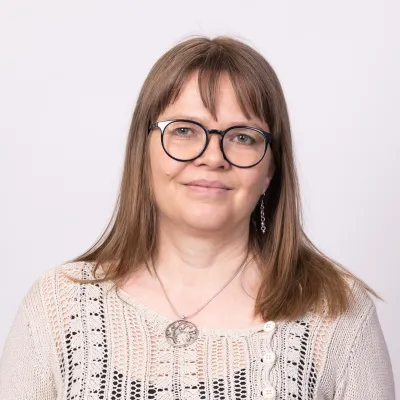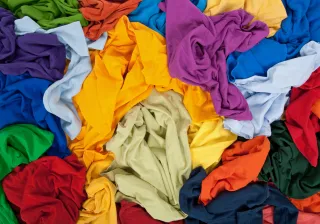In Finland, end-of-life textiles no longer end up in landfills, but there is still a lot of room for improved efficiency in their recycling and reuse. The first phase of the Telaketju R&D project, aimed at promoting sustainable recycling of end-of-life textiles, has been completed. According to VTT's preliminary estimate, the annual market potential of mechanical recycling of textiles would be at least EUR 60 million and it could reach up to EUR 120 million.
"The European's Union requirement to arrange separate collection of textile waste by 2025 made it necessary for Finland to build up the system for recycling of textiles. In addition, a large number of companies is interested in novel circular economy business models that promote the reuse of textiles. Within Telaketju project we have demonstrated the manufacturing of different kinds of products from recycled fibres and created the foundations for a recycling business," describes Senior Scientist Pirjo Heikkilä from VTT who coordinates the Telaketju project.
The focus of research has been on the development of the process stages of recycling and finding new uses for the different textile fractions. VTT's foam laying pilot was used for testing different recycled textile fractions in the manufacturing of nonwoven fabric. Furthermore, a new type of extruder was used to produce a material suited for composites from textile products containing different fibres, such as pillows.
"In the project, we established a value network that collaboratively enabled the implementation of a chained production demo. End-of-life textiles collected from consumers in the Turku region were sorted and delivered to France for fibre extraction. The Telaketju research partners and companies used these to make their demo products, such as nonwoven fabrics, composites and acoustic panels," recounts Senior Scientist Eetta Saarimäki from VTT.
The trials related to the recycling value chain have shown that recycling of textiles could be possible in Finland as well. However, this requires that we can add the missing pieces to the Finnish production chain.
To make it possible to use textile waste for new materials and expand the product range, we need to be able to, for example, identify the textile fibres and the chemicals used in them. The sorting technologies must also be developed to ensure sufficient volume and quality of material for industrial recycling processes. Lounais-Suomen Jätehuolto, a waste management company southwest of Finland and one of the key actors of Telaketju, is already planning a sorting and processing plant of textile waste in Turku. It is expected to launch its operation in a year's time.
New business activities to Finland: market potential of EUR 60–120 million
VTT has drawn up a preliminary estimate of the market potential of mechanical recycling of textiles. According to the estimate, the annual market potential would be EUR 60–120 million, in which case it would have employment impacts on about 150–300 people. The first-phase investments would require EUR 20–30 million. Opportunities to expand business could be envisioned particularly in the areas of Stockholm and St. Petersburg. VTT's preliminary assessment takes account of the amount of textile waste generated in Finland, the recycling rate of end-of-life textiles, price estimate of secondary material and as-yet undefined level of the EU's recycling requirement, which could well be above 50%.
The market potential will be even higher, when business activities run in accordance with circular economy principles and other recycling technologies are taken into account. Finland is also doing research on and developing the reuse and chemical recycling of textiles and the use of textiles as energy, because it has been estimated that they might have market potential as well.
The estimated amount of textile waste produced in Finland is 70–100 million kilos a year. The consumption of textiles in Finland is 13–18 kg per inhabitant, and the value of clothing and home textiles sold is EUR 3.4 billion.
The Telaketju project 2017–2019
Telaketju is a project entity that focused on creating a business value chain related to the recycling, sorting and use of end-of-life textiles in Finland. The project and its two sub-projects were launched by VTT, Turku University of Applied Sciences, Lahti University of Applied Sciences and Lounais-Suomen Jätehuolto in 2017 with the support of the Ministry of the Environment and Tekes (currently Business Finland). The project entity was expanded in 2018, when the Ministry of Economic Affairs and the Employment and the Regional Council of Southwest Finland joined in to fund the processing plant investment.
Final report of the project: https://cris.vtt.fi/en/publications/telaketju-towards-circularity-of-textiles
Telaketju 2 to continue the building of a textile ecosystem
The Telaketju 2 project is currently in its planning stages and its funding application has been submitted to Business Finland. In the project, both companies and public research institutes will engage in the development work. The objective is to build enhanced business opportunities for the Finnish business world in the circular economy of textiles, taking account of the new kind of circular business models aimed at improved material efficiency and extended life cycle of textiles, as well as business operations related to recycling.
Telaketju project: https://telaketju.turkuamk.fi





